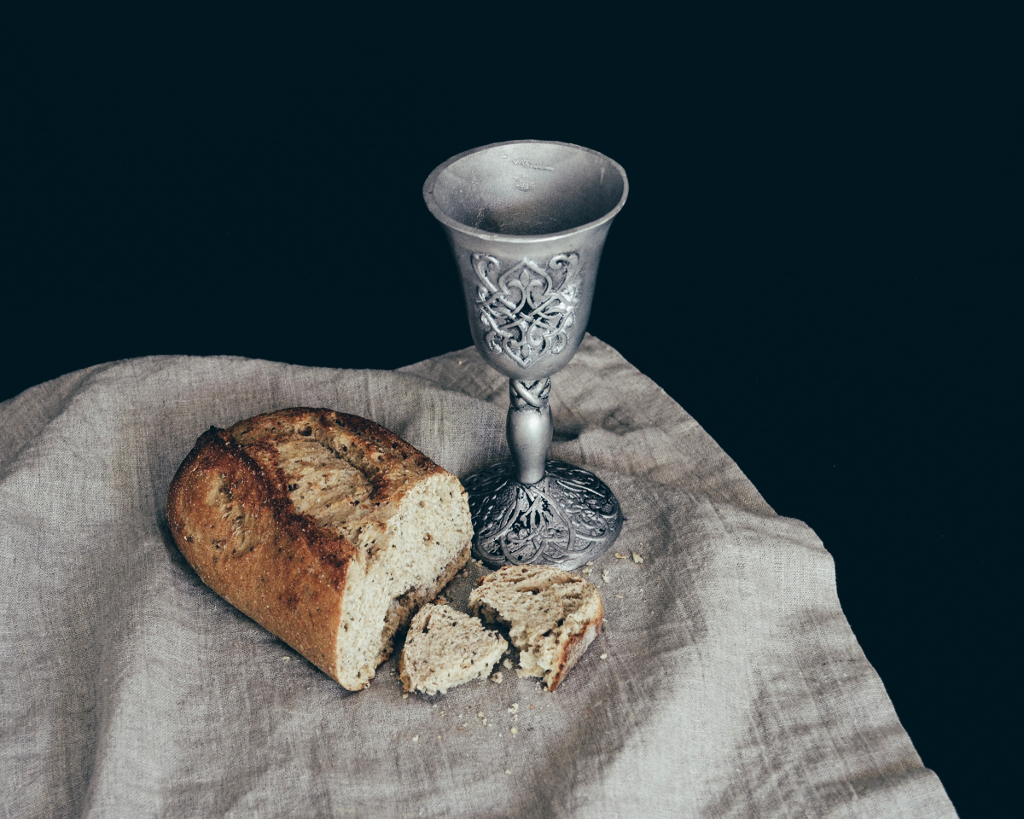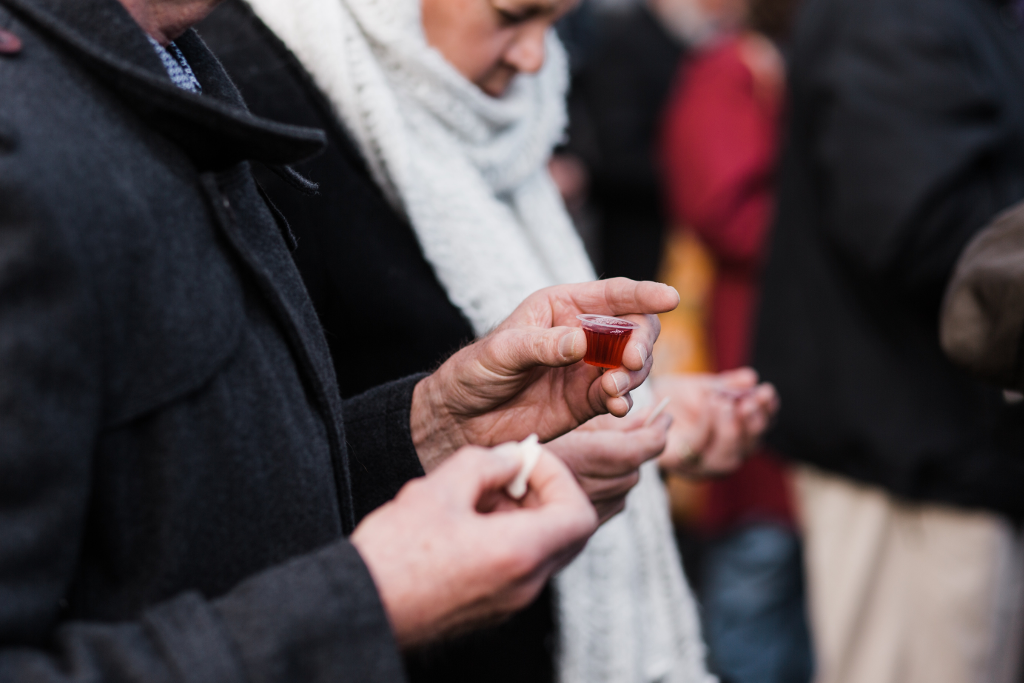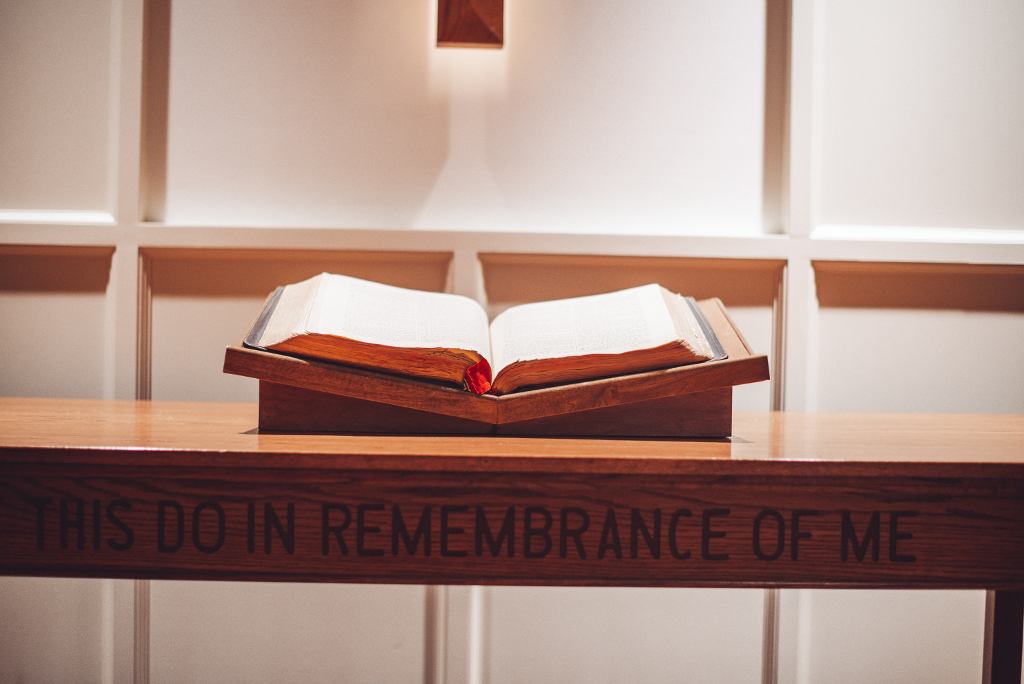
Dateline: Canton, OH

This article will look at communion – the Lord's Supper.
If you've read my blogs and articles, you've heard me talk about the absurdity of rites and rituals common in many church activities. Many of these practices are events that fool us into thinking we are doing something holy or righteous or doing something for God. Churches often use ceremony as a means of worship - as a method for getting closer to God. Rites and rituals only fool our senses into thinking we are having an intimate moment with God. Intimacy with God comes from prayer, fasting, Bible study, and solitude, not religious activities.
There are two practices in the church that are considered by many to be holy rituals. They are baptism and communion. These could be regarded as rituals; however, both were sanctioned by our Lord. Neither brings us closer to God, but both fulfill something Christ told us to do.
Baptism is a symbol sanctioned by Jesus (Colossians 2:12). It represents the death of our old selves and the rebirth of our new selves through the resurrection of Jesus. It is openly declaring to the world, heaven, and hell that you are a follower of Christ. It is not a solemn event; it is a glorious celebration.
Communion is similar in nature. Jesus initiated the practice the night before his death on the cross. Jesus told us to practice communion to remember. Jesus prescribed it for us to remember the suffering he endured in his body and the blood he shed for us, which brought about the forgiveness of our sins (Luke 22:19-20). It, too, is a glorious event.
We get carried away with communion making it something that it is not. In the more ceremonially driven churches, baptism and communion are often called the Holy Sacraments of the Protestant Church.
Neither of the actions of baptism or communion makes us more holy, nor do they make us "better Christians." Both are holy because both activities fulfill the instruction Jesus sanctioned to honor and remember him. Baptism represents our death and resurrection through the death and resurrection of Jesus. It’s also a proclamation to the world, heaven, and hell that we belong to Jesus Christ.
The Lord’s Supper represents our remembering what Jesus did for us:
- He gave up his glory to be born like us in the flesh
- He taught us about God, the Trinity, and prayer
- He taught us about heaven, hell, the Law, the Prophets, and the coming Kingdom
- He taught us about love, anger, peace, joy, sacrifice, and holiness
- He willingly accepted ridicule, betrayal, pain, and suffering
- He died on the cross, an excruciating death, and willingly shed his blood as atonement for our sins.
- After three days, he was raised back to life, defeating death and sin for all those who believe in him
- He made us perfect before a Holy God and inheritors of all things

On the night before his death on the cross, Jesus gave us the practice of communion. We need to understand both the content and the context of the occasion. It was during the Passover. The Passover is a time of grand celebration. It's not a solemn time. Jesus stated very simply: "Do this in remembrance of me.” The Greek word for ‘remembrance’ is ‘anamimnéskó.' Its literal meaning is 'remember with affection.’
At the original communion, our Savior stood in the middle of a celebration and asked those closest to him to do this act. The purpose was to remember him and what he did and was about to do for Christians everywhere (Luke 22:19-20).
That’s it! It’s indirectly about salvation and sin; however, it is primarily about Jesus, who he is, and what he has done. It’s not a solemn event. It’s a time of celebration and affectionately remembering Jesus, our Savior. It is an act of both love and worship. It’s about Jesus, not us.
Paul says to the Philippians:
Philippians 1:3 NIV
The word 'remember' in Philippians is the same root word as 'remembrance' in Luke 22:19. In the way Paul remembered the Philippians with fondness and love, Jesus wants us to remember him.
In the churches, we have perverted the Lord’s Supper by making it religious, sedate, and ceremonial. We try to make it much more than it is, and these actions diminish the simplicity of the practice. Paul calls it “the cup of blessing” in the ESV or “the cup of thanksgiving” in the NIV (1 Corinthians 10:16).
Christians can't seem to strike the proper balance regarding the Lord’s Supper. Some churches do it so often that it is taken for granted. Other churches seldom have communion, and there is everything in between. In some churches, the congregants have no idea what they are doing or what the ceremony represents. On the other hand, many churches see it as a solemn, stoic event. Both extremes miss the mark. Communion should be a time of great celebration – it should be more of a festival than a funeral.
There are churches that take communion and then participate in a sit-down dinner with their congregants. These churches have captured the essence of what the Lord's Supper is all about.
As a result, our communion services should be joyous and festive. The early Christians would have a "love feast" before or after the Lord's Supper celebration, paid for by the wealthy but enjoyed by all (Jude 1:12 & 2 Peter 2:13).
In 1 Corinthians 11:20-34 MSG, Paul adds a new dimension to our understanding of the Lord's Supper. It seems those worldly Corinthians were abusing communion. Paul admonishes them for doing this. The Corinthians were turning the Lord's Supper into a glutinous affair. To make matters worse, some were invited while others were left out. Some people would go home drunk and gorged, while others would go home hungry.
It was very much like what we have done to Christmas. Christmas is simply celebrating the birth of the Savior of the world; however, we've turned into something COMPLETELY different from that. In some circles, we are not even permitted to use the word "Christ" in association with Christmas.
Paul calls the behavior of the Corinthians an abuse of the Lord’s Supper and not the earmarks of Christian behavior. From that perspective, he gives us verses 27-28:
1 Corinthians 11:27-28 NIV
From this passage, the Fundamentalists get their funeral approach to the Lord's Supper. The Fundamentalist love words like “unworthy” and “ought to examine themselves.” They see this as a license for us to create “worthiness.”
They say things like "Get right with the Lord before you drink the cup" or "Make sure you have confessed your sins before you take part in communion." This view implies that somehow we can become righteous (worthy) through an act or behavior.
This fact is why we are at the Lord’s table; to remember what Christ did to make us worthy.
Paul said:
Romans 8:1 NLT
Both the content and the context of the verses are not talking about sins we have committed but about our condition regarding salvation. Some were excluding Believers from their dinners. Those people do not have the heart of a Christian. They should examine themselves to see if they have indeed committed their life to Jesus and made him their Lord and Savior.
Fundamentalists consider this a call to become worthy before drinking the cup and eating the bread. True if one is not a Christian. That is not true if one is a Christian.
No amount of preparation or repentance will make us worthy. That is why communion is a celebration. Jesus made us worthy, and we drink and eat to remember what he did for us.
The sickness and dying Paul refers to (vs. 29-32) is the Lord's discipline of Christians for not having Christ's heart not because we took communion without being worthy.
Paul goes on to say:
1 Corinthians 11:33-34 MSG

We should celebrate the Lord's Supper because the Lord told us to do it to remember him. How often we do it is a question not defined in the Bible. Some churches do it weekly, some monthly or quarterly. There also is nothing that says communion needs to take place in a church setting.
You can use a small group as a venue to celebrate the remembrance of our Savior’s purpose and life. If you are part of a small group, this is an excellent place to celebrate the Lord's Supper.
You can also get together with friends over dinner and celebrate the Lord's Supper before or after dinner.
The important thing to remember is that it is all about Jesus and the incredible thing he did for us.
Join Our Mailing List



See Also:
